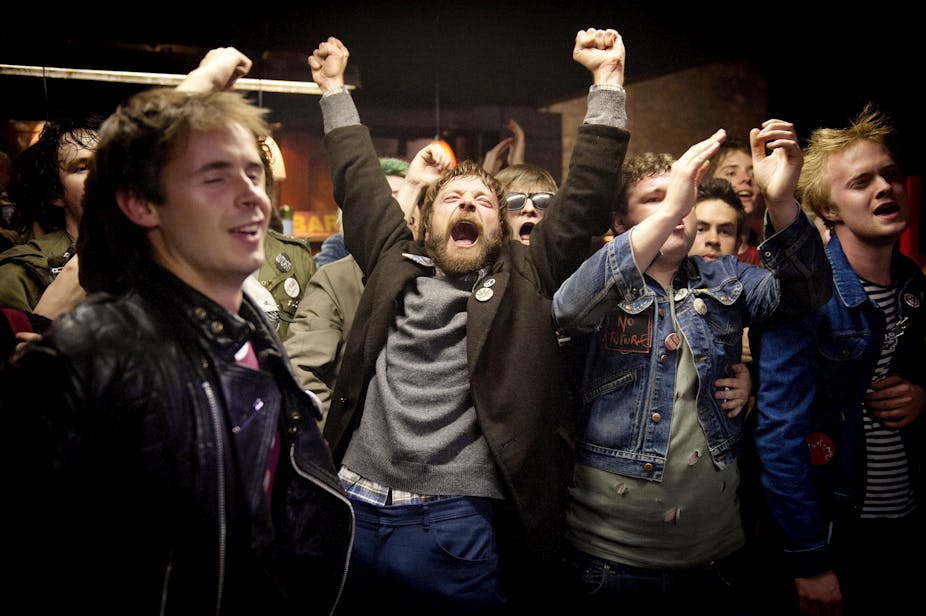Punk music’s role in overcoming sectarian divides during one of the bloodiest chapters in northern Irish history isn’t a topic we hear much about. But that’s the subject of the film Good Vibrations, currently screening in Australia, as its subject, Belfast music legend Terri Hooley, explained to me recently.
During the 1970s and 1980s Belfast was associated with the sectarian conflict known as the Troubles which largely ceased with the Good Friday Agreement of 1998. Since then the city has since transformed itself into a vibrant hub for the entertainment industry. Belfast is now home to the production wing of the HBO television program Game of Thrones – which has brought 900 full-time and 5,700 part-time jobs to the city.

Good Vibrations tells the true story of Terri Hooley, who took Northern Irish punk music to the world when few were prepared to travel to Belfast to see it themselves. Hooley ran a record shop called Good Vibrations and vigorously promoted local punk bands in Ireland and beyond.
Portrayed by Richard Dormer (who also stars in Game of Thrones as Beric Dondarrian) in the film, Hooley entered the music scene as a DJ at the age of 15 in Belfast before sectarian conflict reached its peak. I spoke to him recently about his experiences. He recalls Belfast before the troubles with pleasure:
The 1960s was a wonderful time to grow up in Belfast; it very colourful, with lots to do and plenty of gigs; the Rolling Stones, The Beatles and Bob Dylan would come and play.
And then the Troubles came, and then nobody came over to play in Belfast; it was a horrific period in our lives. Pubs and clubs were being bombed, and Belfast became very black and white. It was the only city centre in Europe where people just didn’t go out at night. It was all pretty dismal.
The name Good Vibrations stands in contrast to the very bad vibes which characterised much of Belfast during the 1970s.
We’d all hung about in the clubs and bars, and then when the Troubles came, Protestants went to the Protestant areas and Catholics went to the Catholics areas, and people tended to stick there. When you went into the city centre, you were always worried about passing a car in case it blew up, or being shot at.
Which made Hooley’s choice to set us a punk record shop and label on Queen Victoria Street – known as Bomb Alley because it was the most-bombed quarter-mile in Europe at the time – not the obvious one.

Hooley, a self-described “old hippie” who was the most unlikely person to get involved in the punk scene, got caught up in the movement after seeing band Rudi perform and wanting to put their record out. “There was going to be no hope in them getting a record because no record companies were going to come to Belfast to see them,” he says.
Good Vibrations features a foot-stompingly good soundtrack of bands including The Outcasts, The Shangri-Las and The Undertones, whose 1979 hit Teenage Kicks is described by Hooley as the song that changed everything for Good Vibrations:
Nobody in England was interested in us [Belfast bands] because we weren’t English, and nobody in Dublin was because we weren’t Irish, so we basically had to do it ourselves. We recorded it very cheaply in an old clothing warehouse that a friend had set up.
Hooley took the single Teenage Kicks to London and was certain The Undertones would sign a record deal, especially on the back of the success of Belfast band Stiff Little Fingers.
Everyone told me the record was was rubbish! As a last resort I left a copy of the record with BBC DJ John Peel. I left on the Friday and he played it on the Monday night – twice, which was unheard of in the BBC.
The Undertones signed an American record deal within the week.
The film is focused on punk music but it doesn’t ignore the politics of the time. Good Vibrations features young men and women who identify not in this context as Protestant or Catholic but as punks – demonstrating the power of music in overcoming political divides.

The film illustrates the disbelief of soldiers and authority figures that Protestant and Catholic musicians were not divided by religion in their pursuit of the punk movement. Hooley describes the approach to treat this very serious topic of sectarianism with a degree of humour as being a conscious decision.
This would happen on a regular basis. The kids got stopped all the time; when the police found out they were of different religions, they just couldn’t believe it. There’s a lot of stuff in the film which people say couldn’t happen, but the film is very true to life".
Having seen poor representations of the Troubles in previous films, Hooley didn’t want conflict to dominate the story of Good Vibrations.
We couldn’t exclude the Troubles, we had the feature them, but we didn’t want it to be the whole story. This is about the music and bringing people together from both sides.
Good Vibrations is currently screening nationally in limited release.

